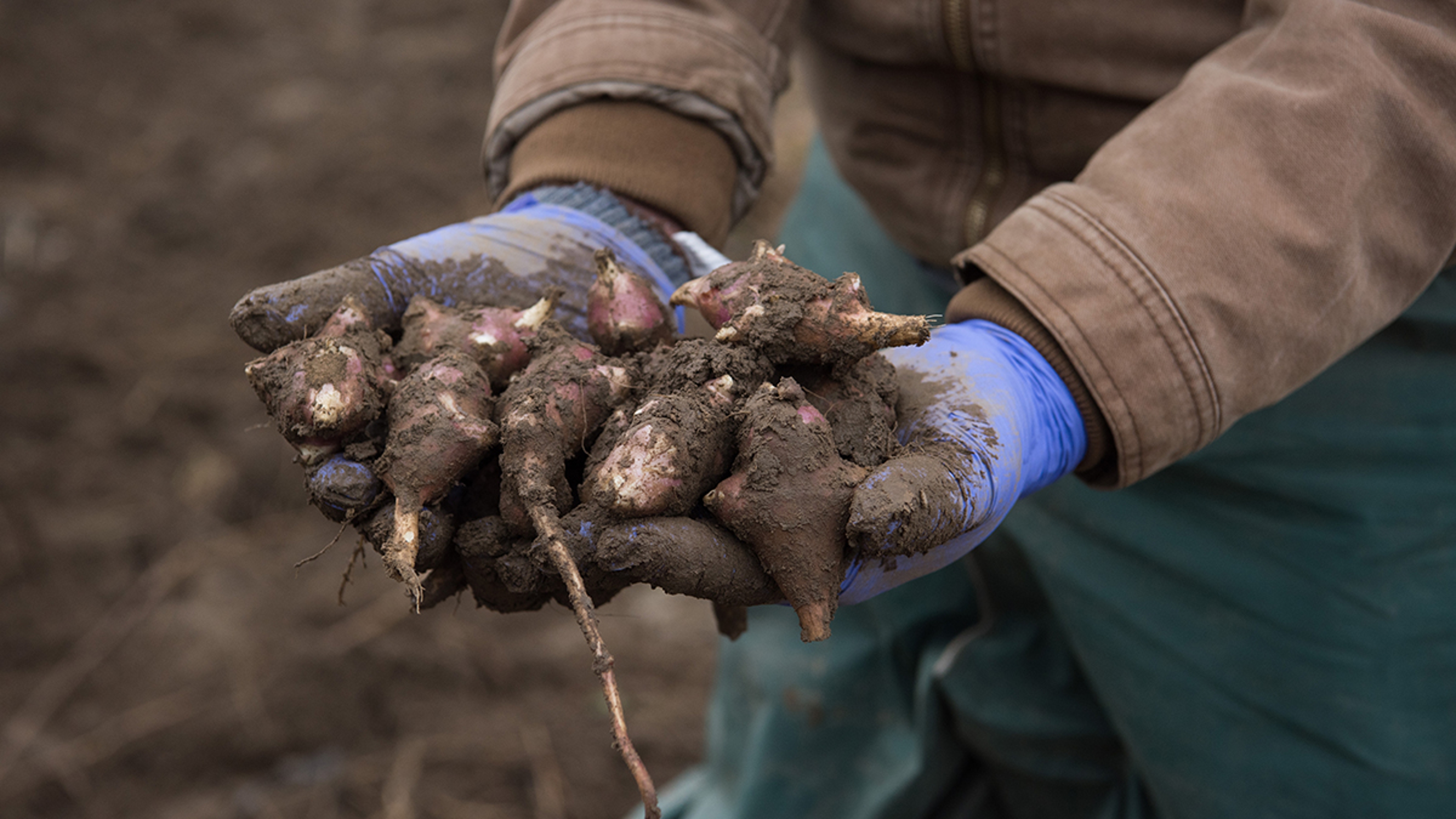February's Veg of the Month: Jerusalem Artichokes
They are neither an artichoke nor from Jerusalem, but these tubers surely are sweet!
Feb 15, 2024
Jerusalem artichokes go by many other names, including "sunchoke," "wild sunflower," and “Canadian truffles." But no matter what you call them, these crunchy-sweet and nutty root vegetables have come a long way since they were once the bane of farmers.
"In my Ohio county — Erie County — in the 1940s, farmers would be fined if Jerusalem artichokes were found on their farms because they were considered an invasive crop of wheat," says Farmer Lee Jones of The Chef's Garden in Huron, Ohio." And now, here we are cultivating them, 80 years later!"

While Farmer Lee only tasted his first Jerusalem artichoke about 20 years ago ("The taste was mind-blowing, like a naturally sweet hash brown or home fry"), this now-prized veggie has long been a popular, hardy root crop among Native Americans in the northeastern part of the United States.
"Jerusalem artichokes, like other root vegetables, are known as 'survival crops' because they are nutrient-dense and easy to grow, so you always have an accessible food source," Farmer Lee explains." Years ago, you'd likely see them in your grandmother's root cellar because they store so well."
Resembling a large piece of ginger, Jerusalem artichokes are rich in inulin, a type of prebiotic fiber that feeds beneficial bacteria in our bodies, which protects our health. They are also high in iron, potassium, and vitamin C, and contain 3 grams of protein per sliced cup. “This vegetable will give you energy!" Farmer Lee exclaims.
What makes The Chef's Garden's Jerusalem artichokes special?
These unique tubers have the texture of a potato but without the starchiness, and are as sweet as sorbet. And, depending on how you treat them, they yield textures that range from the crunch of kettle-style cooked chips to a creamy, silky puree with butter and milk.
"Much like wine, the flavors of the Jerusalem artichokes that we harvest at The Chef's Garden in November improve during storage — they get sweeter!" Farmer Lee exclaims. Lucky for us, this vegetable — which is neither related to the artichoke nor from Jerusalem — offers easy, palate-pleasing, "mind-blowing" ways to spin it, Farmer Lee says. "If you've never had them, you need to try them."
How to care for and store Jerusalem artichokes
Look for Jerusalem artichokes that are free of bruises and cracks, and have a firm, solid texture. Their skins should be wrinkle-free and pale brown without dark or soft patches. Store them at a cold temperature in a plastic bag or damp sand in a cold basement for up to 14 days. When ready to eat, scrub them clean before cooking (obviously); peeling isn't necessary, but you won't break any laws should you choose to go that route.
How to use Jerusalem artichokes
What can't you do with a Jerusalem artichoke?
You can roast, braise, puree, sauté, and even stir-fry them for an umami-rich General Tso-style dinner. Build a better salad by slicing raw Jerusalem artichokes on a mandolin to punch up the crunch and add nutty flavor notes. You can mash these knobby-looking tubers on their own, as you would potatoes, or add them to your favorite potato mash recipe to reduce the starchiness.
Topping a winter-warming shepherd's pie with such a mash would be a delicious and delightful spin on a comfort food classic. Season the mash as you wish, with fresh rosemary, bay leaves, freshly chopped parsley, cardamom, or nutmeg — each pairs well with Jerusalem artichokes.
For winter zing, blister Jerusalem artichokes on high heat in a cast-iron skillet and finish with honey and a squeeze of fresh citrus or a pop of zest. Take hold of the best of the winter season's root vegetables and create a root vegetable tarte Tatin comprising Jerusalem artichokes, carrots, beets, and parsnips roasted in a French pastry crust with Gruyère cheese. Create a silky, brown butter and Jerusalem artichoke soup. And for a wonderfully crispy-on-the-outside and tender-on-the-inside vegetable dish that takes its cue from classic Puerto Rican twice-fried green plantains (tostones), try this recipe for smashed sunchokes. Serve with an herbaceous yogurt dip.
.svg?q=70&width=384&auto=webp)




















